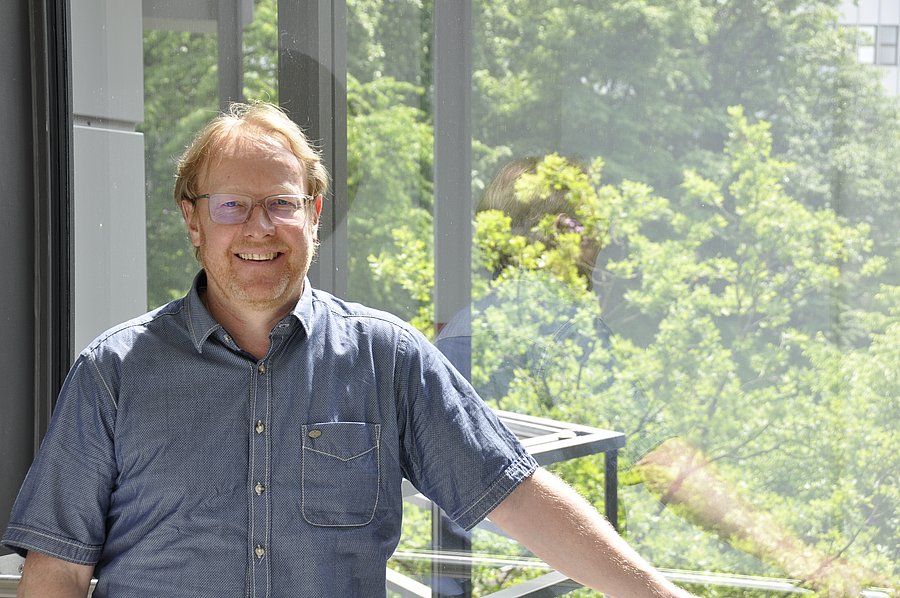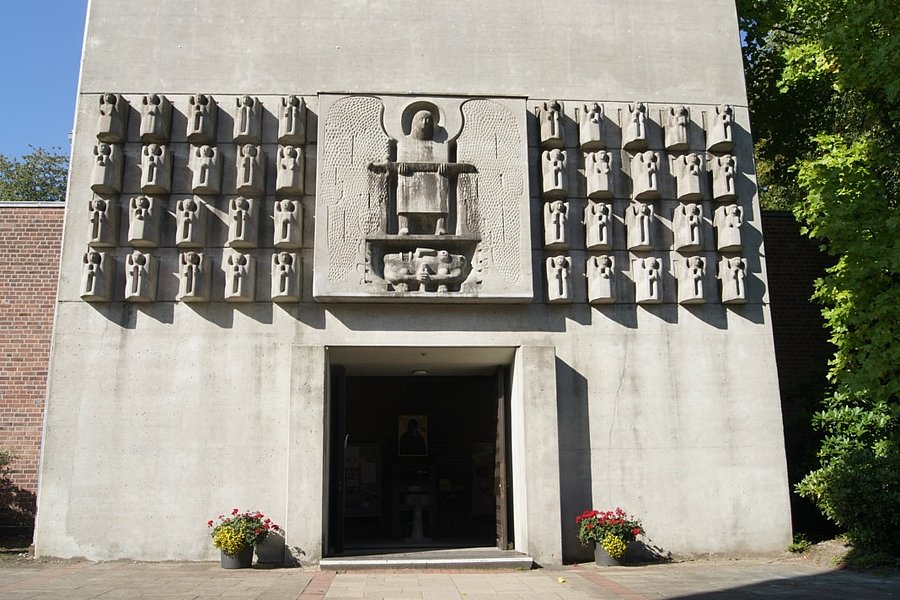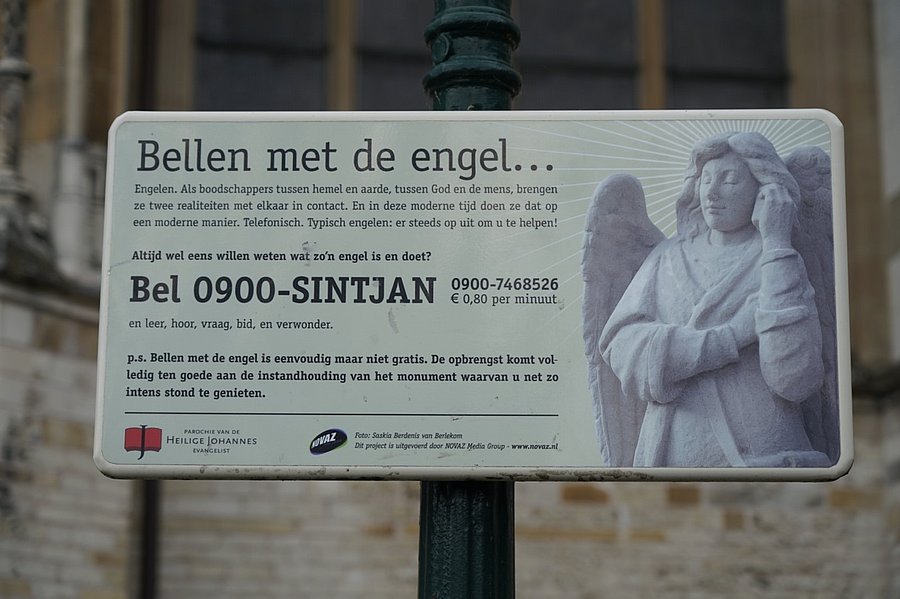
The Omnipresence of Angels
Prof. Dr. Dr. Norbert Brieden / Catholic Theology
Photo: UniService Transfer
"Angels seem to me to be a reality that every human being can sense."
The theologian Prof. Dr. Dr. Norbert Brieden on the omnipresence of heavenly messengers
Melina, a five-year-old girl who was asked by a student in her kindergarten about her ideas of angels says, "You can't see angels, but they can see us. And God can see the angels. (...) When they see us, they protect us. But sometimes God sends them up and then people are unlucky and die and get hurt if God doesn't look out for them." As part of a bachelor's thesis, a student had interviewed several children on this topic, and for Norbert Brieden, professor of practical theology at Bergische Universität, their answers all showed a sense of the differences between humans, angels and God. Whether it is due to the fact that especially young people deal more intuitively with realities, which we adults have lost due to our habits, remains his hypothesis.
Creatures from the invisible world
We find ideas of angels and their description in many texts. But is there also a concrete conception of the winged beings? Brieden answers with a quotation from the artist Paul Klee, who dealt with angels in his paintings throughout his life and formulated in the 1920s: 'Art does not reproduce the visible, but makes the invisible visible`. "This actually also corresponds to the dogmatic concept of angels," says Brieden, "because they are God's creatures. God created the visible and invisible world. Man and creation belong to the visible world, and angels belong to the invisible world." But even this invisible world is not closed to man. "The angels seem to me to be a reality that every human being can sense. But they cannot be held and proved, just as God cannot be proved." We find them in texts, as pictorial works, and in music. Many angels adorn churches and cathedrals around the world. In this context, Brieden refers to his own parish of St. Michael in the Uellendahl district of Elberfeld. "There, the portal is guarded by a whole host of angels." And we find them in music, too. Whether classical in the evening blessing by Engelbert Humperdinck from the opera 'Hansel and Gretel', poppy with the group Real Life under the title 'Send me an Angel' to German rock with Rammstein as 'Angel' from 1997.

Angels at the church St. Michael in the Elberfeld district Uellendahl
Photo: Norbert Brieden
Angels - older than mankind
"According to the myth,angels already existed before there was mankind," says the theologian, because the fallen angel (Lucifer) created places in heaven, so to speak, and God creates the 'angel-like' man, even becomes man himself. In the letter to the Ephesians 1:10 this is formulated very beautifully: ' ... Under Christ as the head everything should be summarized in heaven and on earth`. "Perhaps it can be said that the idea of beings mediating between God and man emerges as soon as there are people who ask about the meaning of it all and believe in God." But Christianity is not the only one to know of beings who stand between the two worlds and possibly also mediate between them, in addition to God and man, Brieden explains. Other cultures then speak of ancestors, souls, spirits, demons, or powers. Interestingly, Brieden says, "many of these spiritual beings were depicted with wings, such as the 'Apsaras' in the Vedic religion, a precursor of Hinduism. The Apsaras were water spirits who used their wings to move around and deliver instructions from the gods to people. Wings were also the identifying mark of Isis, the angel of death in ancient Egypt, or of Hermes, the Greek messenger of the gods." The idea of a human-like being also stems from this Greco-Roman world, the scientist knows. "In the course of history, the winged beings changed their gender every now and then," Brieden reports. "In the Gothic period they were depicted as young men, in the early Renaissance as lovely maidens, and in the 14th century the putti appeared, but they are more of an artificial figure." Their role was always of a helping nature. "In Mesopotamia, where the Hebrew Bible was endredited, the idea of a high god surrounded by a court council prevailed. The Book of Job points out: God asks his council whether or not to test Job." Thus, angels move in a lower transcendence, that is, a realm beyond possible experience or pre-find reality, Brieden explains, which is to be distinguished from the high transcendence, that is, God.
"Angels are here, inside us".
The scope of God's messengers is to convey messages and protect people. Whether disguised as a human being and companion, or marking a path as a pillar of smoke or fire, the perception of the interworldly beings can be very different. Children can probably still most impartially explain how they experience them. Brieden quotes again from the initial study. "For Justus, angels have a white body, white clothes, and wings. They dwell in heaven. From there, they not only help people. He says, 'They make presents for the children. And they help Santa Claus`. For Tabea, the angels also live in heaven. 'They play like us, but they don`t have a car. They can fly to the kindergarten. They have wings. On earth, their job is to protect children. 'When my friend Lucy's mom and dad go out for the evening, the angel watches over my friend.`" When asked where the angels live, children also have clear ideas. Milena, quoted at the beginning of this article, says: "They live in two, eh, three places. Once here, where people live, once in heaven and once here inside us`, pointing to herself. People construct their own ideas of angels, and perhaps, Brieden speculates, children are even closer to this than we adults are. "This transmigration of souls doctrine of Plato," he explains, "this idea that precisely children, when they come into being, have already been with God, or have been near God, shows that they are closer to the origin than we adults are. Many children have imaginary friends, and that is also part of their development. They then see realities that we no longer perceive, because we have long since excluded that through our habits."
Behold, I send an angel before thee to keep thee in the way, and to bring thee into the place which I have prepared. (Exodus 23:20)
Exodus 23:20 is used as a funeral saying as well as in baptismal sermons. "Angels accompany human beings in their transitions - into life and through death to God," says Brieden, "Angels are personal realities through which human beings reveal themselves as the being for whom God longs. God can come close to man through angels. They admonish man to stay on the right path, and for that they deserve respect."
...more, than a mere encounter
Successful author and Benedictine monk Anselm Grün says, 'Angels bring people into contact with the special space of the soul,' but that is not broad enough for theologian Norbert Brieden. "Biblically, an angel is more than a mere encounter with the special space of one's own soul," he therefore says, citing the archangel Michael as an example, who stands by us as a patron in the struggle against those powers and forces that threaten our lives and human life throughout the world. The meaning of his name is also essential there, he said. "Mi-cha-el translated means ' Who (is) like God? ` His name is a reminder to give the highest honor only to the one who deserves it: the God of Abraham, Isaac and Jacob, who carries us even through death." This awareness of the help of the angels, he said, can give us that serenity in trusting God from which we energetically face the challenges of life. "They can strengthen our hope and make us aware that we are all carried and loved by God. For this, the struggle against evil is also important, which for me shows itself in the Archangel Michael."
Angels and crises
In the Qumram writings of Judaism it says: "Hard it is to lift up the head hopefully to the heavenly hosts, when the eyes of all men fearfully see only earthly things. It is difficult to humbly kneel before the messengers of God, while it is easier to obtain glory and wealth through arrogance and haughtiness. The hardest thing for a person, however, is to think like an angel himself, to speak like an angel and to act in such a way that one recognizes an angel in him." Europe is at war again today. Are angels more important today than ever? The churches are also constantly thinking about the evil in the world. "Reflecting on the fall of the angels serves to clarify the question of how evil came into God's good creation," Brieden says, asking, "How did it come about that the initially good angels mutated into evil devils?" Five major factors are discussed across denominations in this regard. "First, lust, i.e., the drives of man; second, intemperance; third, pride as vanity; fourth, envy of God and man because of God's incarnation; and fifth, carelessness out of comfortable security of salvation," the theologian explains. "These angels imperceptibly degenerate because they take for granted what is not self-evident. The motivation to give thanks and worship slackens, and the beings sink into their self-referential self-preservation." Brieden considers the issue of carelessness to be particularly important, because the rule of law, our consumer peace, and social insurances have so far made us seem comfortably equipped. "But current crises such as Corona, climate change, war and inflation are now driving us out of our comfort zone," he points out, adding that our existence seems to be determined by anonymous powers and forces. The question is, how does man face these systemic constraints and 'no-alternative' decisions? At this point, the liturgy could again play an important role, if it made clear to people that Christ stands above the economy and all our apparent constraints. "Then 'living Christianly' would also be able to become more attractive again."

"Telephone with the angel" in the cathedral s`Hertogenbosch/Netherlands
Photo: Norbert Brieden
Brieden discovered a beautiful example of how angels can also be helpful at this point in s`Hertogenbosch, a small town in the Netherlands. Since April 2011, a statue of an angel with a cell phone has been on display on the south facade of the cathedral. A sign points to a telephone number where one can call 'the angel'.
Uwe Blass
Prof. Dr. Dr. Norbert Brieden teaches religious education/catechetics and didactics of Catholic religious education at Bergische Universität.
